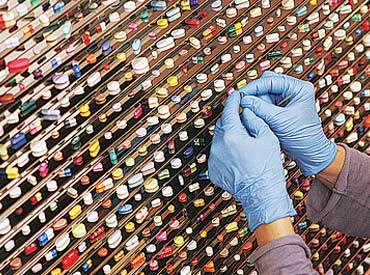
The next time you have fever which refuses to come down despite medication, blame it on the medicine. Chances are that your body has become immune to the medicine, or the percentage of the effective ingredient in the pill you are taking is very low. This is because in India we have a concept called Fixed Dose Combinations (FDC) where more than one type of drug is mixed and sold.
In order to prevent this practice and weed out medicines which are no longer effective, the government has decided to ban some of these FDCs. Developed countries do not have this concept of FDCs.
However, not all FDCs are bad. As pointed out by D G Shah, Director General of Indian Pharmaceutical Alliance (IPA), in diseases like tuberculosis and malaria which are specific to tropical countries like India, antiretroviral FDCs have helped bring down the number of pills a patient has to take without sacrificing on the efficacy of the treatment
A 2015 study by PLOS Medicine shows that of 175 FDC formulations across 4 categories in India, only 60, or 34%, were approved by Central Drug Standard Control Organisation (CDSCO). The findings also show that the sale of unapproved products was higher than that of approved ones, with the 175 FDC formulations appearing in the market as 4,000 products. This, no doubt, will further justify the government’s drug ban.
However, trust the government to make a hash of a good policy. There is no doubt that the intent was good, but the delivery was bad.
It seemed like an overnight decision was taken to impose a ban, a day before a case was expected to come up in the Supreme Court questioning the role of drug regulator in enforcing rules of product safety. Though Chandrakant Kokate, the head of the consultative committee that recommended the curbs on irrational combinations, says that notice had been given to companiesthree months after a sub-clause notice was sent to them asking why their drugs should not be banned. The response from the industry, he claims, was poor.
According to the Ranjit Roy committee set up by health ministry, based on which Kokate committee carried its work, the country has an unacceptably large number of drug formulations – somewhere between 60,000 and 85,000 – in the market. The reason we have such high number of formulations is that state governments have power to clear them.
Doctors themselves are not too happy with the number of drugs, some of them spurious and non-effective that are introduced in the market. A Business Standard report says that doctors have by and large welcomed the move saying that even though it may give a jolt to the pharma sector’s corporate fortunes, the step is meant to correct the situation. A senior AIIMS doctor has been quoted as saying “These drugs have been proven to be harmful for us. Most of the countries worldwide have already banned them. Moreover, this toxicity – proven in many of these drugs – decreases the body resistance to fight any disease.”
But the pharmaceutical industry too has a point. Out of the 6,220 samples that were taken up by the committee 963 have been found irrational after a year of study, but the government decided to ban only 344. If all the 963 drugs are banned the industry would have to take a hit of Rs 10,000 crore, which is nearly 10% of the pharmaceutical market.
The industry has reason to feel betrayed given the opacity with which the entire process has been carried out. Though no one doubts the credibility of Professor Kokate or his group of scientists, the fact that the findings have not been made public is a valid reason for grievance. Banning a drug overnight would not only mean stopping production but also taking back the products that are in the supply chain pipeline. The 344 drugs that have been banned will result in a hit of around Rs 3,000 crore to the sector.
But money is not an issue when it comes to public health and safety. If the poorest of poor patient can find money to pay for the medicine, the least the industry can do without griping is give him value for his money. The industry and the authorities who cleared the drugs need to be taken to task for allowing drugs that are banned abroad to be sold in India.
Asking more time to clear up their inventories of products which should not be in the market in the first place does not make sense.
Pharmaceutical companies willingly shell out millions of dollars to settle cases in the US for not following proper process let alone poor quality products. It is sheer hypocrisy when they cry foul for being pulled up in India for selling products which are no longer effective.
[“source-Business-standard”]

